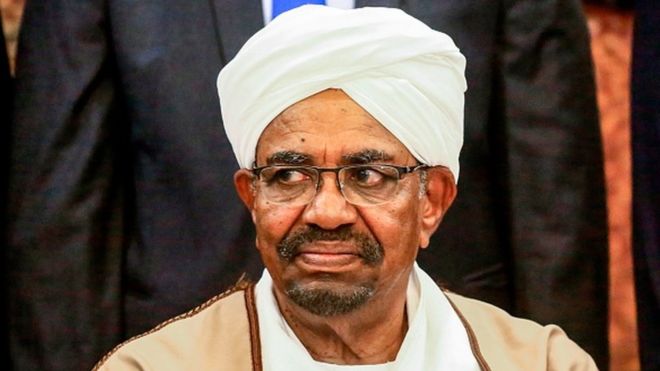Sudan has suggested it is prepared to hand over the former president Omar al-Bashir to the international criminal court in The Hague to face trial for war crimes and crimes against humanity.
The decision marks a dramatic shift from the previous official position of the country’s new rulers, though observers warned that many obstacles still needed to be overcome before the 76-year-old reached a court room.
The exact details of how and when the ex-president might be handed over are unclear, and apparently depend on a comprehensive peace deal between authorities and rebels. There are also doubts about the support of Sudan’s powerful military for such a move.
Bashir has been in prison in Khartoum since being forced from power in April, when security forces withdrew their support for his repressive regime after months of protests.
In December, he was sentenced to two years in a reform facility for corruption, a sentence dismissed as derisory by victims of his brutal 29-year rule.
Since August, Sudan has been ruled by a government and an 11-member sovereign council, which includes pro-democracy campaigners and senior soldiers. These transitional authorities are due to hold power for just over three years until elections are held.
The decision to send “those who face arrest warrants” – a small number of alleged offenders including Bashir – to The Hague was made during peace talks between Khartoum and rebel groups in Darfur, which were held in the South Sudanese capital of Juba.
Representatives of the Sudanese sovereign council agreed to a long-standing rebel demand that those wanted by the ICC would be presented to the tribunal, the information minister, Faisal Saleh, said.
Some observers were encouraged by the fact that the Khartoum delegation to Juba included both soldiers and civilians, though Bashir was not actually named during negotiations.
Bashir denies all the allegations against him. One of his lawyers told Reuters on Tuesday that Bashir would refuse to deal with the ICC because it was a “political court”, and that Sudan’s judiciary could deal with any case against him.
The ousted dictator is accused by the ICC of criminal responsibility for war crimes, crimes against humanity and genocide after the killing, maiming and torture of hundreds of thousands of people in Darfur from 2003 until last year.
The UN estimates 200,000 to 400,000 people died in the conflict and a further 2.7 million were displaced. Militia formed and directed by Bashir are blamed for the worst atrocities.
The ICC has struggled to secure convictions of high-profile criminals in recent years, and the decision will come as a boost to prosecutors.
Jens David Ohlin, an expert on international criminal law at Cornell University, said Bashir’s transfer to The Hague would mean “redemption for a criminal court that has struggled to live up to its creators’ lofty ambitions.
“Although the ICC has generated important legal precedents, it has had few important cases brought to verdict. This is a historic day for international criminal justice,” Ohlin said.
A spokesperson for the ICC declined to comment.
Abdulrahman Deiges, a refugee in Norway forced from his home by an offensive allegedly ordered by Bashir in the Darfur region in 2003, said he cried when he heard the news.
“Today is incredible … nobody thought this day would come,” Dieges, 34, said.
Dr Manisk Hussein, a doctor who fled with her family after their Darfur home was bombed by government forces, said it was “amazing” that Bashir might appear at The Hague.
She said, however, that any trial of Bashir would be meaningless unless others responsible for atrocities went unpunished.
There has been significant diplomatic activity focused on Sudan as international powers scramble to secure influence in the strategically important state.
Abdel Fattah al-Burhan, the most senior figure in the power-sharing arrangement between the military and civilian parties, has been invited to Washington.
Last week the United Nations secretary general, António Guterres, called for the country to be removed from a US list of countries considered to be state sponsors of terrorism. The listing has impeded much-needed international financial assistance and commercial activity in Sudan.
US officials said the removal of Sudan from the list was “not [like] flipping a light switch”.
“It is definitely a process. Everybody wants it to move forward as quickly as possible,” one said during a conference call with reporters on Monday.
“Absolutely, the United States of America continues to support the transition process and the civilian-led transitional government.”
Burhan met the Israeli prime minister, Benjamin Netanyahu, in Uganda earlier this month but was forced to deny reports of an imminent normalisation of relations between the two countries.
In December, the ICC prosecutor Fatou Bensouda told the UN security council she had been “emboldened by positive political changes” over the last six months and that she hoped “Sudan will honour its commitments to deliver justice” for the victims of the conflict in Darfur.
The prime minister, Abdalla Hamdok, has repeatedly called on the west to allow Sudan to fully reintegrate with the international community.
Civilian authorities in Sudan are due to take the lead for the final 18 months of the 39-month transition.
-The Guardian




